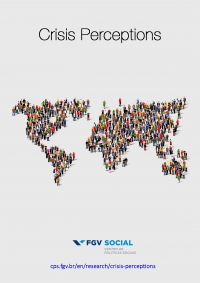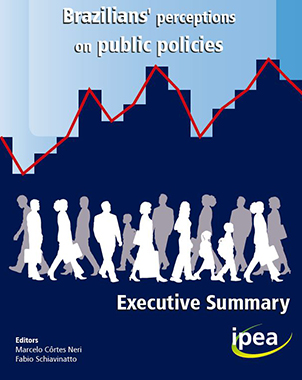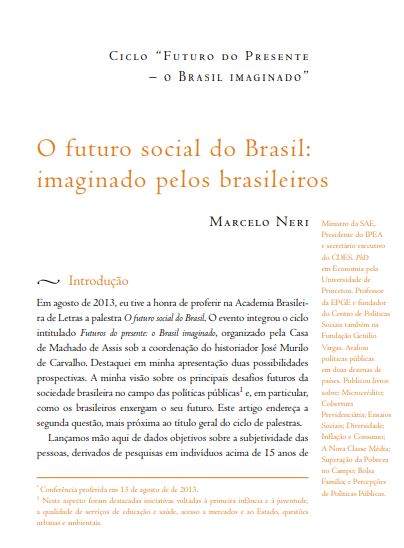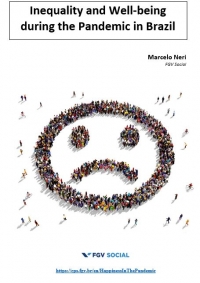 Inequality and Well-being during the Pandemic in Brazil
Inequality and Well-being during the Pandemic in Brazil
June/2021
Just over a year after the Covid-19 pandemic hit the country, what has happened to labor income inequality and prosperity since then? What about the subjective indicators of well-being such as happiness and everyday emotions? How does Brazil compare to the rest of the world?
The Top of Inequality - The pandemic adds another three hundredths to the labor based Gini Index bringing it to 0.674 in the first quarter of 2021*, our all-time series record (since 2012). The literature considers this movement a great leap in inequality. Before that Brazil had already the 8th highest overall income Gini among 159 countries.
Prosperity - In the January to March 2020 quarter, mean income reaches its highest point of the series at R$ 1122 and in less than a year it falls 11.3% reaching the lowest point of the historical series at R$ 995*, the first ever point beneath a thousand reais a month. 11.3% Drop
Social Welfare - We integrated the evolution of the mean with inequality as components to measure the nation’s overall social welfare. Labor welfare in 2020Q1 was at technical tie with the beginning of the historical series in 2012, in other words, there was no net social progress this decade. In the year following the pandemic well-being fell by 19.4%, a new low for the series*.
The Poor Lost More – Switching to mean individual income from work including informal workers and those without work, it fell 10.89% between the first quarters of 2020 and 2021. The income decline of the poorest half was 20.81%, almost twice as much as the overall mean.
Happiness is gone - Considering subjective measures of well-being, a result of people’s direct assessment about their lives. We start with an overall measure of happiness given by a rating of satisfaction with life on a scale from 0 to 10. Brazil experienced an average drop of 0.4 points in 2020, reaching 6.1 the lowest point in the historical series since 2006.
Inequality of Happiness - The fall in happiness occurs in the poorest 40% (-0.8%) and in the middle group (-0.2) situated between 40% and 60% of income. The wealthier groups, however, maintained their satisfaction with life. In other words, there is an increase in the inequality of happiness during the pandemic. The difference in life satisfaction between the income extremes was 7.9% in 2019 rising to 25.5% in 2020.
International Comparisons - The Covid-19 pandemic has markedly affected the daily lives of people around the globe. As an experiment we compared Brazil with 40 other countries surveyed covering a wide sample of nations from Austria, passing through China reaching Zimbabwe. Brazilians average life satisfaction grade fell from 6.5 in 2019 to 6.1 in 2020. In the rest of the world, the score was unchanged by the pandemic remaining at around 6.0. Essentially, there is a marked relative loss of happiness for Brazilians during the pandemic.
Everyday Emotions - There are also specific measures of well-being that ask for emotions felt in relevant quantities on the eve of the survey date. This refers to feelings of anger, worry, stress, sadness and fun. Feelings of anger in Brazilians rose from 19% in 2019 to 24% in 2020, a change of 5 percentage points. In the world, this advance was 0.8% percentage points. In other words, anger increased 4.2 percentage points more in Brazil during the pandemic than it did the rest of the world. Similarly: worry, stress and sadness rose by, respectively, 3.6, 2.9 and 2.2 percentage points more in Brazil than in the rest of the world. All subjective indicators of well-being considered worsened more in Brazil during the pandemic than the average of the other 40 countries.
Overall - The pandemic has worsened inequalities within Brazil and caused greater loss in well-being here than it did for other nations. Even in happiness Brazil is now more unequal.
* Based on a four-quarter moving average of household per capita effective earnings reflecting all labor ingredients (earnings, occupation, informality etc) in the first year of the Covid-19 pandemic. See https://cps.fgv.br/en/HappinessInThePandemic
https://cps.fgv.br/en/HappinessInThePandemic
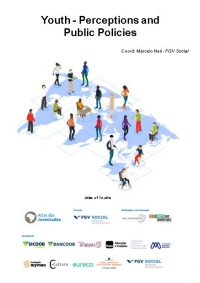 Youth - Perceptions and Public Policies
Youth - Perceptions and Public Policies
June/2021
We explore research on young people's aspirations and assessments on a global scale, which allows us to differentiate the vision of young Brazilians. As well as capture the new paths taken in the pandemic. The general self-assessment of happiness among Brazilian youth, captured by the average life satisfaction at present on a scale of 0 to 10, was 7.2 in 2013-14 and decreased to 6.7 in 2017-18. This downward trend continues during the pandemic, going from 6.7 in 2019 to 6.4 in 2020. A drop of 0.8 points like the one that occurred with overall happiness in Brazil, ranked as the 3rd highest drop in 132 countries. A score of 6.4 is the lowest in the Brazilian series of life satisfaction. In addition to the general assessment of life, we cover the daily emotions of youth. Positive (joy) and negative (worry and anger) indicators worsened significantly in both the great recession and in 2020 in the pandemic. Negative indicators also worsened in 2019, a difference to be highlighted.
We focus here on the state of variables that occupy a prominent place on the agenda of young people, such as education and the environment. 41% of young people between 15 and 29 years old are satisfied with the education system in 2020, the lowest level in the series. There was a 375% greater drop in Brazil than in a set of 40 other countries interviewed during the pandemic that worked as a control group. The proportion of young Brazilians satisfied with the efforts undertaken to preserve the environment dropped from 33.1% in 2015-18 to 27% in 2019 and then 19% in 2020.
https://cps.fgv.br/en/Perceptions
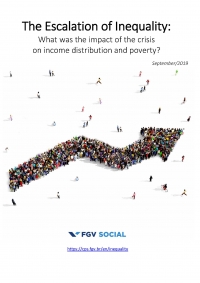 The Escalation of Inequality - What was the Impact of the Crisis on Income Distribution and Poverty?
The Escalation of Inequality - What was the Impact of the Crisis on Income Distribution and Poverty?
September/2019
The research shows, first hand, that per capita household earnings inequality has been increasing for 17 consecutive quarters compared to the same month last year. This is the longest period of rising concentration in the Brazilian historical series. Not even in 1989, the historical peak of Brazilian income inequality, was preceded by a concentration movement for so many consecutive periods.
As the previous historical series of PNAD Continuous microdata was adjusted by IBGE, the study investigated forward and backward innovations in earnings inequality. From the end of 2014 until the second quarter of 2019, the income of the poorest 50% of the population fell 17% and that of the richest 1% grew 10%. More than a long recession followed by a slow recovery, the country has moved from inclusive growth to an income concentration recession. 2014 was the turning point.
The biggest loser of the crisis were individuals aged 20 to 24 years, blacks; illiterates, residents of northern and northeastern Brazil. From the traditionally excluded groups, only women had a 2% income increase. The past few years have improved for those who have studied more, and as women.The increase in the value of education was together with that of unemployment the great drivers of inequality in general.
https://cps.fgv.br/en/inequality
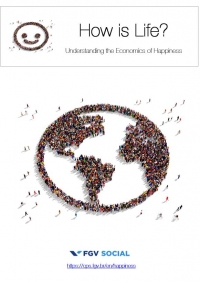 How is life?: Understanding the economics of happiness
How is life?: Understanding the economics of happiness
March/2019
Does money bring happiness? What are the links between economics and social well-being in Brazil and the world? Is the country a point outside the curve? Beyond the structural aspects captured in global figures, in recent years Brazil has suffered the worst recession in its statistically documented history, offering the opportunity to test those aspects in the extreme Brazilian case: has the quality of life declined to a greater or lesser degree than in other countries? What are Brazilians’ lives like? Why is the nation’s general happiness declining more than its GDP? Is it unemployment, inequality, disillusion with politics, or all those aforementioned alternatives? Who has suffered most from the Brazilian recession - women, rural residents and or the illiterate? Or who of the poor, rich or the so-called new middle class has lost most happiness? These are the questions this study looks to answer.
Brazil suffered the third largest drop in life satisfaction among 130 countries between 2014 and 2018. This study suggests that the nation's overall happiness decreased in parallel with a great recession reflected not only in higher unemployment but also with disillusionment with politics and rising inequality. Subjective happiness of Brazilians has dropped more than GDP. Objective indicators of social welfare taking into account not only the growth of people's income, but its distribution, help to explain better this trajectory.
https://cps.fgv.br/en/happiness
Crisis Perceptions
October/2018
Research compares Brazilians’ perceptions to rest of world
The survey “Crisis Perceptions”, published by FGV Social – Center for Social Policy on October 17, shows how Brazilians see several aspects of their political and social context. Based on microdata from the Gallup World Poll, FGV Social compared Brazilians’ perceptions to those of 124 countries.
“We often think that the world is complicated and that Brazil is too. Actually, Brazil is much more complicated”, said the director of FGV Social and author of the survey, Marcelo Neri.
The subjective data on a global scale shown in the survey sheds light on the values and peculiarities of Brazil’s current situation. The study compared the evolution of Brazilians’ perceptions to those of 124 countries in some of the most sensitive issues of the current scenario: fear of violence, disbelief in the political system and lack of confidence in the State. These figures place Brazil as second to last in each of these issues among all countries surveyed in 2017, the worst result in the Brazilian series.
The study also showed that 68% feel unsafe walking at night in their neighbourhood in Brazil; just 14% believe in the honesty of elections and 82% do not trust the Federal Government. Only Afghanistan ranks worse in the first two issues, and Bosnia in the last. These figures help us understand the priority given to safety, the lack of transparency in the electoral process and the breakdown of the State in the current Brazilian political moment.
The renewal of traditional political scenarios, seen in the first round of the 2018 elections, can be understood from the 86% disapproval rate of Brazilian political leaders. It was not only the highest disapproval rate on the planet last year, but also the highest in the historical series examined in more than 733 cases (number of countries times years surveyed). That is, a record in the global series for this decade.
According to the study, the extreme perceptions of Brazilians captured in an extensive list of countries, including the poorest, suggests a critical psychosocial situation. The trajectory of the subjective series of this decade led to the study of the objective and subjective causes of the 2013 protests, one of the main landmarks of Brazilian society in its recent history.
In order to understand the perceptions, the street demonstrations and the nature of the challenges ahead, we need a longer-term insight into Brazil’s main social and economic advances and mishaps. Against a backdrop of global objective indicators, there have been advances in income distribution, education and life expectancy in Brazil. However, according to Neri, “we have not been able to advance in aspects limiting economic performance such as labor productivity and fiscal balance. It’s as if social indicators improved without a solid economic foundation in this period. This mismatch would indicate a need for structural reforms to align both sides of the socioeconomic equation, finally meeting Brazil’s aspirations”.
https://cps.fgv.br/en/research/crisis-perceptions
Population Perceptions of Public Policies
June, 2014
The Population Perception book presented here has as its main objective to present a panel of indicators of the population's perception aimed at subsidizing reflections and actions of the State and society. The Ipea based research conducted allows us to verify how the population from different economic strata and social segments perceive aspects related to the design of different public policies. In this way, it provides subsidies to the State to better understand and act more effectively in meeting the demands of citizens, and also provides instruments for society to demand actions from their governments that are more in line with their needs and concerns based on representative samples of data. With this initiative, Ipea started to occupy an important space in the production of primary data and analysis of social perception that is still incipient in the country. In addition to providing data and analysis on people's perceptions, these surveys also allow for international comparisons. The initiative was awarded, in 2013, by the United Nations (UN) for its contribution to the My World survey, which addresses the choice of priority themes with a view of defining the new Millennium Development Goals (MDGs) for the period after 2015. This book, in its first part, discusses structuring themes for the country, from the perspective of the population on the world of work; quality of public education; the causes of poverty and the means to overcome it; the situation of urban mobility and issues of public security and national defense. The second part, of a more transversal nature, deals with perceptions of social structure, values and democracy in Brazil, media and means of communication. In addition to these themes, the book deals with the economics of happiness, analysing the behavior of Brazilians' individual and collective well-being and the relationship between life satisfaction and income from an international perspective. Finally, it proposes the creation of a synthetic perceived human development index (PHDI) for a set of more than one hundred countries based on dozens of questions about perceptions applied to the issue of education, work, income and health. The book, therefore, provides a rich panorama of the perceptions of Brazilians about aspects of their lives and of the country, in particular with regard to public policies.
https://cps.fgv.br/en/featured/brazilians-perceptions-public-policies
The Social Future of Brazil: Imagined by Brazilians
August/2013
Article written for Brazilian Academy of Literature’s (ABL) Journal: "O Futuro do Presente: O Brasil Imaginado."
Read the article at (in portuguese) https://www.cps.fgv.br/cps/bd/docs/ABL_O_futuro_social_do_Brasil_Marcelo-Neri.pdf





